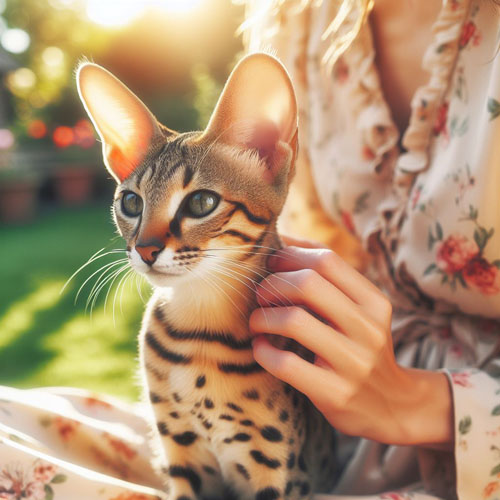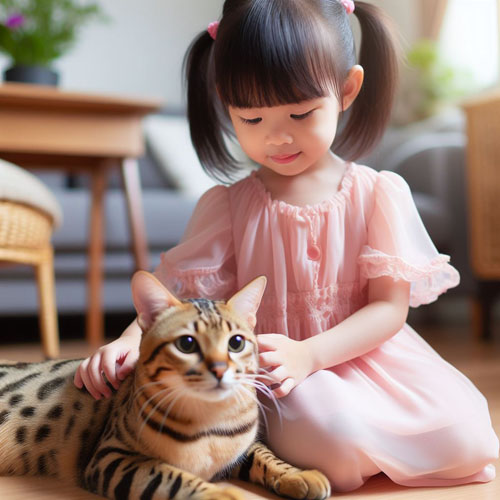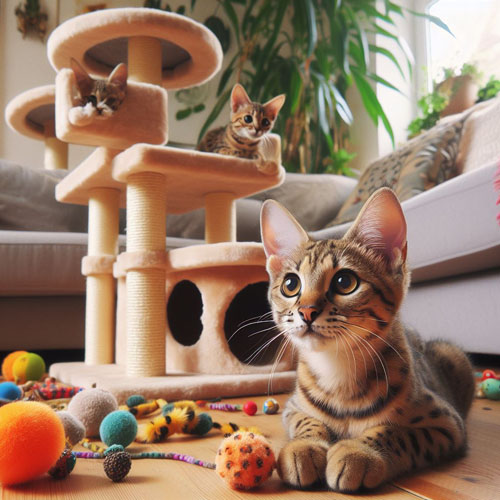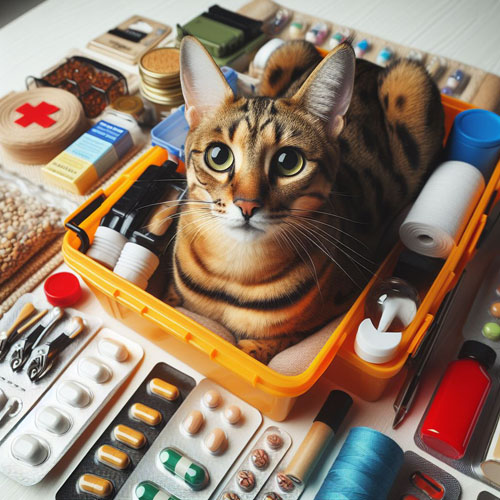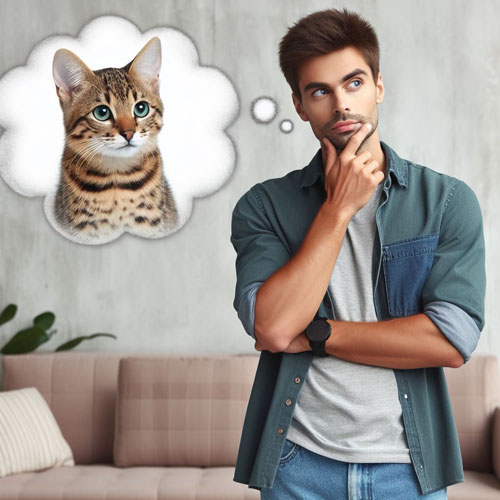Unveiling the Ancestry: The Importance of DNA Testing for Savannah Cats
The Savannah cat, which is tall and graceful, originated in the latter part of the 20th century. The Savannah hybrid breed was produced by breeding an african serval with a Siamese cat. The African cat lineage of the species is evident in its long legs, huge perked ears, and spotted coat, all while maintaining the amiable nature of a domestic companion.
One thing to be aware of with Savannah cats is their size. Depending on the generation, adult Savannah cats may reach heights of 17 inches and weigh up to 25 pounds. First-generation crossings (F1 and F2) have gorgeous spotty brown, tan, and black coats. They are also often bigger than subsequent crosses. Though smaller and somewhat calmer later generations, also have the colors and patterns of their wild progenitor despite being farther distant from them. Although curious, wise, and devoted, Savannah cats may not be ideal for first-time cat owners.
History of Savannah Cats
Savannah cats originated in the United States and were created in the 1980s. This gave rise to the Savannah Cat, a tall, slender, long-legged feline with a distinctive, wild appearance and a stunning, spotted coat.
Breeders quickly saw the potential of this gorgeous cat, as was to be anticipated. As a result, throughout the years, the number of Savannah cats has increased dramatically via breeding. The International Cat Association officially approved Savannah Cats as a breed in 2001.
Advanced Savannah Cat Genetic Testing
Savannah cat breeders have several sophisticated testing tools nowadays. This ensures the healthiest kittens are under their care. Genetic testing of savannah cats using the Wisdom Panel has become the standard test module for breeders. The Wisdom Panel is a genetic test that can provide information about a cat’s breed heritage and health conditions. Testing savannah cats can help owners understand their cat’s genetic background and potential health risks. The article also mentions that the Wisdom Panel can detect certain genetic mutations that are common in certain breeds, which can be useful for breeders and owners looking to avoid certain health issues. Some of the testing is mentioned below.
Test for PK Deficiency
Breeders call PKdef PK deficiency. Cats with PKdef have severe hereditary anemia. A cat may be (N, N) and will not carry the illness. Testing results (N, K) indicate that the cat has one copy of the disease and may pass it on to kittens but will never become sick. (K) means they carry a single gene. (K, K) means they carry two copies of the gene and will have the disease.
Testing may provide (K, K). This cat has a sickness. It implies the cat will grow sick and die because of PKdef. The cat should never be bred or allowed to reproduce. It will infect every kitten, becoming a carrier and maybe full-blown kittens from the other parent. Selecting a kitten from a breeder who has examined and tested their adult cats is wise.
Progressive Retinal Atrophy Testing
Degeneration of the retina causes gradual vision loss in both eyes and ultimate blindness. This will not kill a cat, but it is a horrific thought. Blind cats may become fearful and attack anything that causes them fear. This includes family. Responsible Savannah cat breeders screen their cats to prevent this illness from spreading to kittens.
PRA-CEP290 tests Savannah cats for PRA. Cats without sickness are N/N. A carrier cat has one RDAC copy. The entire illness is inherited by rdAc/rdAc cats. Affected cats are born with normal eyesight, develop retinal degeneration at about seven months, and become blind by 3-5 years—an untreatable condition.
This test only finds the CEP290 gene mutation that causes PRA-rdAc in Abyssinian, Somali, Munchkin, Ocicat, Siamese, American Curl, Bengal, Cornish Rex, American Wirehair, Singapura, and Tonkinese. Many early breeders employed Siamese and Bengal. Other breeds have PRA testing.
Hypertrophic Cardiomyopathy
Cats with hypertrophic cardiomyopathy (HCM) have thickened heart walls. This reduces cardiac efficiency and may flood the lungs with fluid. The Savannah cat breed has no particular test yet. Since there have been crossings of a Maine Coon to the serval, several breeders, like myself, may utilize the HCM test for maine coons in savannah cat testing. The best HCM test is echocardiography. This test creates a heart picture using sound waves. HCM cats have thicker left ventricle walls and reduced capacity. Search for TICA cat show-sponsored HCM clinics for this pricey testing.
Color Testing
Color testing is safe. Most breeders use this test to determine a cat’s mating colors. Savannah Cat breeders mainly employ Agouti (tabby) and Charcoal Chocolate/Cinnamon testing. Silver and smoke are not colors. Hence, there is no test.
Blood Group Mismatch
Most cats have Type A blood, few Type B, and even fewer AB. Type A and Type B cats have antibodies for each other. Kittens born from Type A cats breeding with Type B cats will bleed. If the breeder doesn’t know, they may lose the litter. This is rare.
A breeder who loses litters should test the parents. Notably, the two cats may reproduce, but the kittens must be collected immediately and bottle-fed for a few days—a short explanation of this situation’s mechanics. Genetic texts explain this well. A simple blood type sample will reveal the mismatch.
Polymerase Chain Reaction (PCR) Testing
Routine genetic testing is different from PCR testing. The test does not assess cat genetics. It tests for biological organisms that cause a cat or animal sickness.
Responsible breeders do two health checks on their kittens before they leave for their new homes. Start with the Feline Respiratory Panel. It checks for certain diseases: Feline calicivirus, Mycoplasma felis, feline herpesvirus 1, and Bordetella bronchiseptica.
Cat GI/Diarrhea Panel is the second test. It detects Clostridium difficile toxins A and B, Salmonella, Cryptosporidium, feline parvovirus (Panleukopenia) also called distemper, Giardia, feline coronavirus, canine parvovirus 2, and Tritrichomonas fetus.
These two tests detect most cattery-related illnesses in kittens. Naturally, a quick test for feline leukemia at the veterinarian and a fecal sample for coccidia is also crucial.
Conclusion
With their magnificent look and unique lineage, Savannah cats have a fascinating and intricate world. Advanced DNA testing is essential to comprehend and preserve this breed’s health, ancestry, and individual traits. These tests are necessary to keep Savannah cats healthy, from detecting genetic disorders to guaranteeing ethical breeding practices. It is essential to recognize the science that contributes to preserving their heritage even as we continue to be in awe of their brilliance and beauty.
